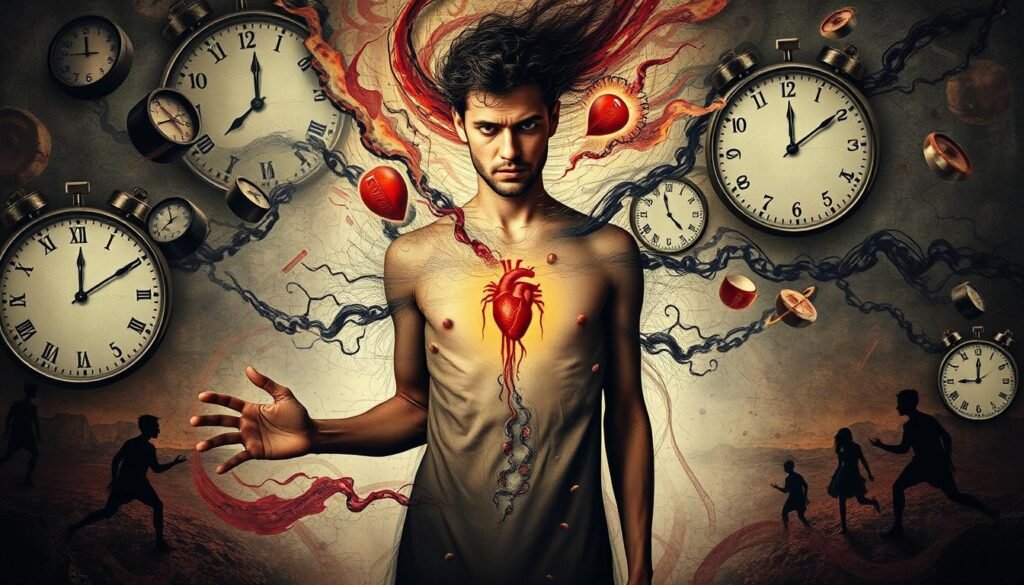Have you ever felt dizzy for no reason? Or maybe your muscles tensed up suddenly? These might not just be random incidents. Weird physical symptoms of anxiety are often missed. But knowing about them is important. This can help you look for the right treatment. This article talks about how anxiety can show up in physical ways, like feeling sick or having muscle pains. It shows how anxiety affects our bodies differently. And it encourages you to pay more attention to what you’re feeling.
Key Takeaways
- Weird physical symptoms of anxiety can include dizziness, muscle tension, and nausea.
- Physical symptoms, such as heart palpitations, often lead to misunderstanding anxiety’s impact.
- Recognizing these symptoms could be the first step toward managing anxiety effectively.
- Anxiety can escalate chronic health issues if not addressed properly.
- The physical sensations associated with anxiety may significantly affect daily life and relationships.
Understanding Anxiety and Its Physical Impact
Anxiety is more than just feeling stressed or worried. It can vary from mild unease to intense fear. Knowing about anxiety helps people handle it better.
Anxiety doesn’t just affect your mind; it also hits your body hard. People often get tight muscles, especially around their shoulders and neck. This tension might cause headaches or even migraines. Digestive problems, like upset stomachs or irritable bowel syndrome, are also common.
Research shows that anxiety can lead to serious health issues. It can increase the risk for heart disease and worsen asthma. For example, being anxious all the time can raise your blood pressure. This makes problems like diabetes more likely. Anxiety weakens your immune system too, making it harder to fight off sickness.
It’s important to recognize when anxiety’s physical signs become too much. Getting help like therapy or medication can make a big difference. Methods like cognitive behavioral therapy (CBT) are very helpful. Don’t forget about taking care of yourself through exercises and calming activities.
Learning more about anxiety enables people to deal with it more effectively. Understanding it allows for better management of its effects on both mind and body. This understanding is key to improving our health and happiness.
Common Physical Symptoms of Anxiety
Many people feel anxiety not just in their minds, but in their bodies too. These physical signs go beyond simple worry. They show up in ways that can make everyday life hard.
Anxiety Chest Tightness
Feeling tightness in the chest is a common way anxiety appears. It feels like the chest is being squeezed. This can make someone very uneasy and it’s hard to think of anything else.
This feeling is partly because anxiety makes the body release adrenaline. That can lead to feelings of panic.
Anxiety Heart Palpitations
Many people with anxiety feel their heart beat fast or hard. It’s similar to how your heart feels after running fast. This can make someone feel more anxious.
It creates a cycle of worry that makes the heart race even more.
Anxiety Shortness of Breath
When someone is really anxious, they might breathe fast or not deep enough. This happens because the body wants more oxygen to face what it sees as danger. These feelings can be scary.

| Symptom | Description | Potential Impact |
|---|---|---|
| Anxiety Chest Tightness | Squeezing sensation in the chest | Can lead to panic attacks |
| Anxiety Heart Palpitations | Fast or pounding heartbeat | Causes distress and worry |
| Anxiety Shortness of Breath | Rapid or shallow breathing | Mimics serious medical issues |
Knowing about these physical signs of anxiety is key to dealing with it. When you recognize anxiety, you can start to feel better. It helps in looking for the right help when it’s needed.
Weird Physical Symptoms of Anxiety
Anxiety disorders come with various physical symptoms that can be quite surprising. While chest tightness and heart palpitations are well-known, other symptoms are less recognized. These can make daily life hard, causing distress and confusion.
Anxiety Dizziness
Anxiety dizziness is an unsettling symptom. It feels like light-headedness or a spinning sensation. It often comes from hyperventilating or the body’s stress response. This can lead to more fear and worsen the dizziness.
Anxiety Muscle Tension
Another weird symptom is anxiety muscle tension. Many feel chronic tightness in their neck and shoulders. This can cause headaches or migraines. Chronic muscle tension makes physical comfort hard and can raise anxiety levels.
Anxiety Nausea
Anxiety can also lead to nausea, accompanied by abdominal pain. Stress changes in the digestive system cause this, affecting daily activities and meal enjoyment. Chronic cases can lead to ongoing anxiety about food and outings.

Noticing these weird symptoms of anxiety should prompt seeking help. Understanding how anxiety shows up in unexpected ways, including dizziness, muscle tension, and nausea, can help manage it better. This can lead to a happier life. Read more about weird physical symptoms.
The Fight-or-Flight Response
The fight-or-flight response is key for survival. It kicks in with danger or stress around. Our bodies react to fear by preparing to face the threat or run away. This response was crucial when facing wild animals. But now, it reacts to things like work stress or problems in relationships.
When this response is triggered, we might feel short of breath or have chest pain. It means our body is ready for action. But it can make things like breathing hard. It can also upset our stomachs, causing fast or slow digestion. For those with conditions like IBS, this can be tough.
Increased heart rate and sweating are also common. Anxiety can change how we breathe. It can make us feel dizzy or light-headed. This makes doing everyday things difficult. It’s not just feeling nervous; our bodies physically react to fear.
If stress keeps happening, it can tire us out and harm our health. It’s important to find ways to deal with this chronic stress. Trying meditation or yoga can help. Getting professional advice is also a good step. To learn more about how this response affects us, click here.

The Role of Stress Hormones
Stress hormones are crucial for how our bodies react to stress. Cortisol and adrenaline are the main ones released. They affect our immediate responses and long-term health. Knowing about them is key to handle stress and stay healthy.
The Impact of Cortisol and Adrenaline
Cortisol, called the “stress hormone,” controls metabolism and our fight-or-flight response. If cortisol is high for too long, it causes issues like anxiety, digestive problems, and tension in muscles.
Adrenaline boosts heart rate and energy quickly in dangerous situations. But if it’s activated too much, it keeps us too alert. This can harm our health over time.
Long-Term Health Consequences
Being exposed to stress hormones for a long time can mess up body functions. This raises the risk of heart disease, high blood pressure, and stroke. You could also get digestive problems and mental issues like anxiety and depression.
How stress is seen and felt can depend on genes and past traumatic events. This leads to different feelings and more health risks.
Understanding Panic Attacks
Panic attacks can happen suddenly and feel very intense. It’s important to know about them if you might have panic disorder. Knowing the signs is key. They can look like other serious health problems. This knowledge helps people get the right help quickly.
Signs of a Panic Attack
A panic attack has many scary and confusing symptoms. Some common ones are:
- Chest pain or discomfort
- Heart palpitations or rapid heartbeat
- Shortness of breath
- Dizziness or lightheadedness
- Sweating or chills
- Tingling sensations or numbness
- Fear of losing control or dying
These symptoms usually last from 5 to 20 minutes. But, they can last longer for some. People might have panic attacks a few times a month or week. Knowing the signs helps manage them. It stops them from getting worse.
Sometimes, panic attacks come from health issues or mental health problems. Getting help can reduce these tough symptoms. This lets people take back control of their lives. If you’re worried about anxiety, try taking an anxiety quiz. It helps you understand your symptoms and find the right treatment.
Specific Anxiety Disorders and Their Symptoms
Understanding specific anxiety disorders helps recognize various triggers and symptoms. Each disorder, especially social anxiety disorder and generalized anxiety disorder, majorly affects daily life.
Social Anxiety Disorder
Social anxiety disorder is when someone feels extreme fear in social settings. They may panic during interactions, leading to sweating, trembling, and a fast heartbeat. It makes maintaining relationships tough because people often avoid socializing.
Generalized Anxiety Disorder (GAD)
Generalized anxiety disorder involves endless worry about life aspects, like work and health. Symptoms include fatigue, trouble focusing, muscle tension, and irritability. People with GAD feel their anxiety is never-ending and find stress hard to manage. Understanding these disorders can lead to effective treatments and interventions. For further details on anxiety disorders, visit this link.
When to Seek Help for Anxiety Symptoms
Anxiety affects many people, often sparked by life’s challenges. Knowing when to seek help is key for those feeling overwhelmed. Symptoms like a racing heart, chest discomfort, and non-stop worry can disrupt daily life.
Consulting a healthcare provider is crucial when anxiety affects your routine. They can check for health issues that seem like anxiety. Mental health therapy is critical for treating anxiety effectively. Therapists use approaches like cognitive-behavioral therapy (CBT) for better recovery.
Don’t ignore signs that you need help. Trouble sleeping, feeling shaky, or having unusual physical symptoms could mean an anxiety disorder. Getting help early leads to healthier outcomes. Starting treatment early is crucial for mental health, preventing long-term issues.
Learning about generalized anxiety disorder and others is essential. It highlights the importance of discussing mental health issues. It encourages people to take mental wellness seriously.
| Type of Anxiety Disorder | Common Symptoms | Treatment Options |
|---|---|---|
| Generalized Anxiety Disorder (GAD) | Excessive worry, insomnia, restlessness | CBT, SSRIs |
| Social Anxiety Disorder | Fear of social situations, avoidance | CBT, antidepressants |
| Panic Disorder | Recurrent panic attacks, fast heart rate | Cognitive therapy, SNRIs |
Getting mental health therapy is vital. It doesn’t just manage symptoms but also helps build coping skills. Adding lifestyle changes like exercise and mindfulness enhances treatment benefits. These practices are key in managing anxiety.
Conclusion
It’s vital to understand anxiety and its physical signs. This includes chest tightness, dizziness, and feeling sick. Knowing these can help people know when they need support. Around 40 million adults in the U.S. deal with anxiety. So, staying aware is key to managing it well.
Treating anxiety might involve therapy, like CBT, or taking medications such as antidepressants. Sertraline is one example. It’s important to pay attention to your symptoms. Long-term anxiety can make other health issues worse. Knowing when anxiety changes your everyday life or causes panic is crucial.
Getting to know anxiety allows for seeking the right help. This can be through therapy or taking care of oneself. Handling anxiety well can make life better. By understanding anxiety and its effects, individuals can take steps to regain peace and control in their lives.